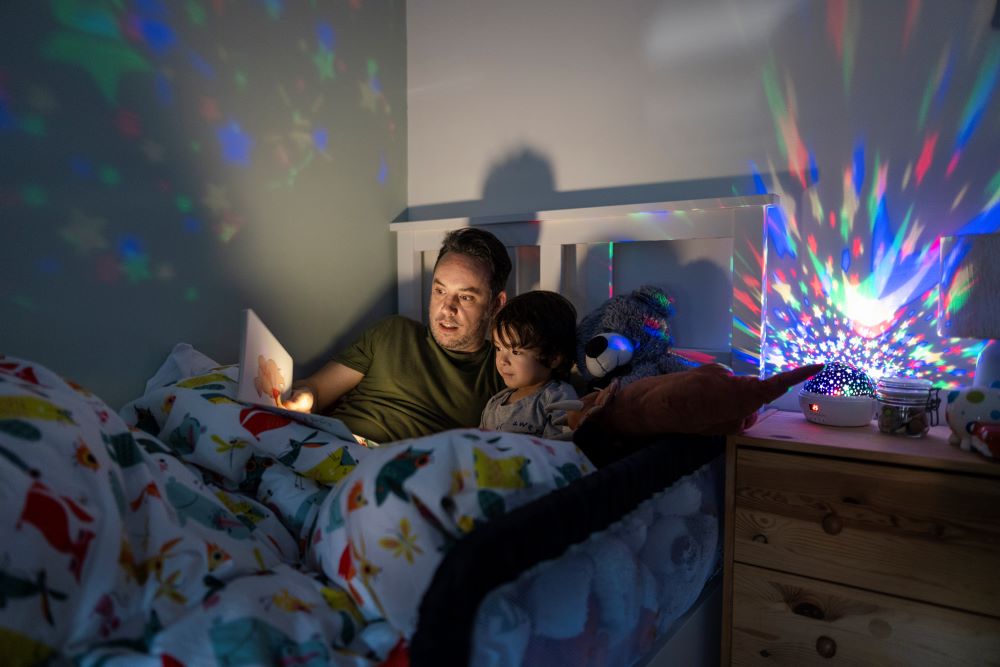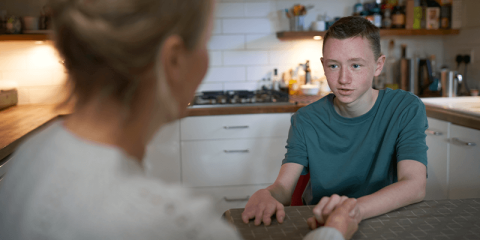A good night’s sleep can make all the difference to your child’s mood. It’s also super important for physical and mental health as it helps the body repair and renew itself and the brain process thoughts and memories. So if your child or teen is struggling to fall asleep, or to stay asleep, we’ve put together some tips they could try.
How much sleep should my child or teen be getting?
This of course various from child to child. However, as a general guide:
- 11-13 year olds typically need between 9 and 11 hours of sleep.
- 14-17 year olds typically need between 8 and 10 hours of sleep.
- 18-25 year olds typically need between 7 and 9 hours of sleep.
Tips for older children and teenagers to help them get a good night’s sleep
Tip #1: Keep active
Encourage your child to be as active as they can during the day and to get outside as much as they can – our page on activities for teens has lots of ideas.
Tip #2: Keep the bedroom a device-free zone
They’re not going to like this, but if they’re having trouble getting to sleep, suggest that they keep their bedroom a device-free zone for a while, or at least try not to look at any screens for an hour or two before they go to bed.
If they charge their devices over night, why not put the chargers in the kitchen or living room, to keep them out of the bedroom?
Tip #3: Reduce noise and light
If noise or light are stopping them from sleeping, get them to try ear plugs or an eye mask.
Tip #4: Avoid caffeine and sugary foods
Suggest they try and reduce the amount of caffeine and sugary foods they consume, especially late in the day, as these can keep us awake. Try making them a hot milky drink instead.
Tip #5: Try a hot bath or shower
A hot bath or shower before bed can be relaxing. As the body cools down in bed, it helps you go to sleep.
Tip #6: Relax
Suggest they try some relaxation techniques before they go to bed, like yoga or meditation – this podcast from the Mental Health Foundation is designed to help you relax and get ready to go to sleep.
Tip #7: Have a regular sleep routine
If you can, make sure your teen keeps to a fairly regular sleep routine – this helps the body know when it’s time to go to bed and time to get up. While everyone needs a bit of a lie in at the weekend, try not to let them stay in bed all morning!
Tip #8: Talk through any worries
If your child isn’t sleeping well it may be because they’re worried about something. Let them know that they can always talk to you about anything that’s on their mind. Our pages on encouraging your child to confide in you and talking to your teen has more advice on getting young people to open up. And if they don’t want to talk to you or anyone else they know, they can always talk anonymously to someone who can help by calling Childline, Breathing Space or the Samaritans.
They could also try writing down a list of the things that are worrying them – this can help get things into perspective and make things more manageable. Our page on mental health advice for parents has some tips for dealing with negative thoughts that they could try. Young Scot's Aye Feel hub also has lots of information for young people how to look after their emotional wellbeing, support from organisations around Scotland and tips on how to promote a positive mindset.
More information
You can find more tips and advice on what to do if poor sleep is a problem at the Mental Health Foundation website. You can also find further information and advice on the Sleep Action website.
 Activities & Play
Activities & Play Behaviour
Behaviour Childcare
Childcare Development & Growing Up
Development & Growing Up Family, Friends & Relationships
Family, Friends & Relationships Feeding Your Baby
Feeding Your Baby Food & Eating
Food & Eating Health & Safety
Health & Safety Mental Health & Wellbeing
Mental Health & Wellbeing Money & Work
Money & Work Online Behaviour & Safety
Online Behaviour & Safety Pregnancy & First Days
Pregnancy & First Days School & Education
School & Education Sleep
Sleep







 Mental Health & Wellbeing
Mental Health & Wellbeing
 Health & Safety
Health & Safety